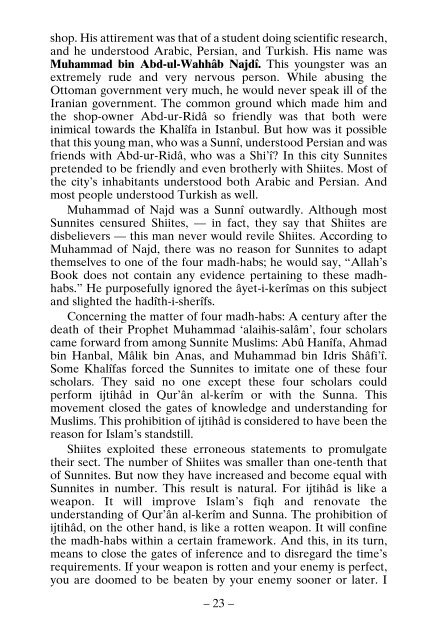Confessions Of A British Spy
Muhammad of Najd was the sort I had been looking for. For his scorn for the time’s scholars, his slighting even the (earliest) four Khalîfas, his having an independent view in understanding the Qur’ân and the Sunna were his most vulnerable points to hunt and obtain him. So different this conceited youngster was from that Ahmed Efendi who had taught me in Istanbul! That scholar, like his predecessors, was reminiscent of a mountain. No power would be able to move him. Whenever he mentioned the name of Abû Hanîfa, he would stand up, go and make an ablution. Whenever he meant to hold the book of Hadîth named he would, again, make an ablution. The Sunnîs trust this book very much. Muhammed of Najd, on the other hand, disdained Abû Hanîfa very much. He would say, “I know better than Abû Hanîfa did. In addition, according to him, half of the book of wrong.
Muhammad of Najd was the sort I had been looking for. For
his scorn for the time’s scholars, his slighting even the (earliest)
four Khalîfas, his having an independent view in understanding
the Qur’ân and the Sunna were his most vulnerable points to hunt
and obtain him. So different this conceited youngster was from
that Ahmed Efendi who had taught me in Istanbul! That scholar,
like his predecessors, was reminiscent of a mountain. No power
would be able to move him. Whenever he mentioned the name of
Abû Hanîfa, he would stand up, go and make an ablution.
Whenever he meant to hold the book of Hadîth named he would, again, make an ablution. The Sunnîs trust this book
very much.
Muhammed of Najd, on the other hand, disdained Abû Hanîfa
very much. He would say, “I know better than Abû Hanîfa did.
In addition, according to him, half of the book of wrong.
Create successful ePaper yourself
Turn your PDF publications into a flip-book with our unique Google optimized e-Paper software.
shop. His attirement was that of a student doing scientific research,<br />
and he understood Arabic, Persian, and Turkish. His name was<br />
Muhammad bin Abd-ul-Wahhâb Najdî. This youngster was an<br />
extremely rude and very nervous person. While abusing the<br />
Ottoman government very much, he would never speak ill of the<br />
Iranian government. The common ground which made him and<br />
the shop-owner Abd-ur-Ridâ so friendly was that both were<br />
inimical towards the Khalîfa in Istanbul. But how was it possible<br />
that this young man, who was a Sunnî, understood Persian and was<br />
friends with Abd-ur-Ridâ, who was a Shi’î? In this city Sunnites<br />
pretended to be friendly and even brotherly with Shiites. Most of<br />
the city’s inhabitants understood both Arabic and Persian. And<br />
most people understood Turkish as well.<br />
Muhammad of Najd was a Sunnî outwardly. Although most<br />
Sunnites censured Shiites, — in fact, they say that Shiites are<br />
disbelievers — this man never would revile Shiites. According to<br />
Muhammad of Najd, there was no reason for Sunnites to adapt<br />
themselves to one of the four madh-habs; he would say, “Allah’s<br />
Book does not contain any evidence pertaining to these madhhabs.”<br />
He purposefully ignored the âyet-i-kerîmas on this subject<br />
and slighted the hadîth-i-sherîfs.<br />
Concerning the matter of four madh-habs: A century after the<br />
death of their Prophet Muhammad ‘alaihis-salâm’, four scholars<br />
came forward from among Sunnite Muslims: Abû Hanîfa, Ahmad<br />
bin Hanbal, Mâlik bin Anas, and Muhammad bin Idris Shâfi’î.<br />
Some Khalîfas forced the Sunnites to imitate one of these four<br />
scholars. They said no one except these four scholars could<br />
perform ijtihâd in Qur’ân al-kerîm or with the Sunna. This<br />
movement closed the gates of knowledge and understanding for<br />
Muslims. This prohibition of ijtihâd is considered to have been the<br />
reason for Islam’s standstill.<br />
Shiites exploited these erroneous statements to promulgate<br />
their sect. The number of Shiites was smaller than one-tenth that<br />
of Sunnites. But now they have increased and become equal with<br />
Sunnites in number. This result is natural. For ijtihâd is like a<br />
weapon. It will improve Islam’s fiqh and renovate the<br />
understanding of Qur’ân al-kerîm and Sunna. The prohibition of<br />
ijtihâd, on the other hand, is like a rotten weapon. It will confine<br />
the madh-habs within a certain framework. And this, in its turn,<br />
means to close the gates of inference and to disregard the time’s<br />
requirements. If your weapon is rotten and your enemy is perfect,<br />
you are doomed to be beaten by your enemy sooner or later. I<br />
– 23 –


